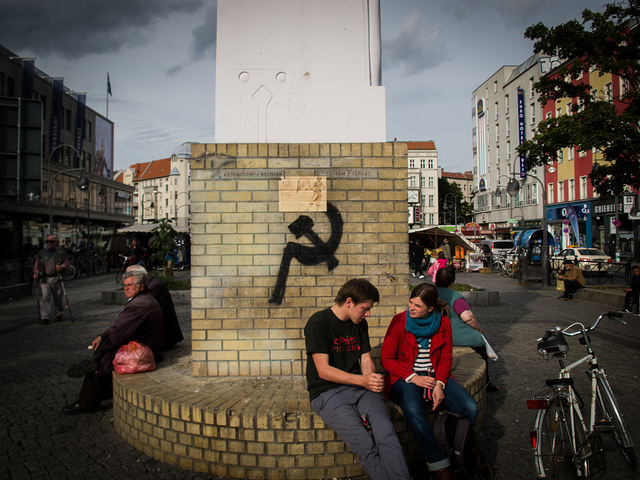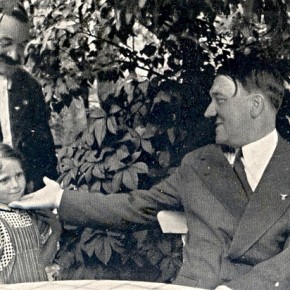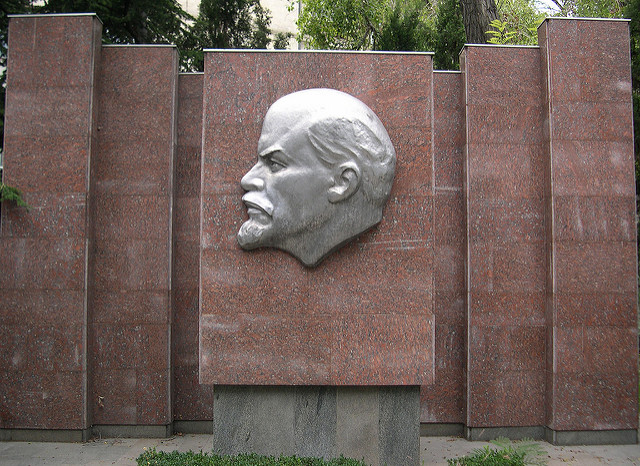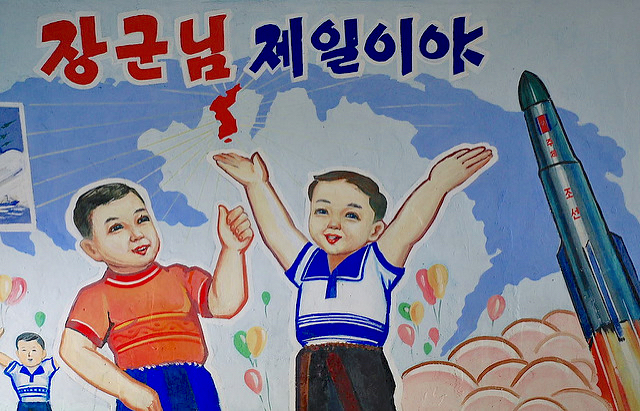The 1990s were a drag. In every newspaper and magazine, on radio, and TV, the death of communism was repeatedly proclaimed, as though it were an alien force that had been successfully repulsed by human nature. Innately capitalist, our innermost needs had prevailed, and the authoritarianism of enforced equality, and state-mandated poverty, had given way to a demonstrably more effective and broader means of distributing wealth.
Given the fascist, racist and money-driven politics that have emerged in the former Soviet bloc in the last two decades, its obvious that such criticisms of socialism were a lie. If capitalism was so great, why would it bring out the worst in people who had been denied its benevolence for so many decades? Something is clearly wrong here. Especially if you buy into the idea that Soviet-style communism was somehow civilizing, when it did little to curb the prejudices and provinciality that characterize its free market successor.
The problem with this scenario is that as it delegitimized criticizing capitalism. Communism was certainly a failure, but so was its free market antithesis. The only difference, in terms of the inequalities it produced, was that the market created more dynamic and wealthy elites, while allowing for some experimentation with socialism. It wasn’t until the advent of the WTO protests in Seattle, in 1999, that Americans and Europeans began to speak openly about the limits of capitalism again, beginning to redress the rhetorical imbalance.
The following flyer is typical of the discourse about the market recovered since that time, or, as some would argue, that has remained consistent for the last century, in spite of the failings of communism. Informed by the early Marx, and Marxist-inspired cultural anti-capitalism, it is decidedly independent in its brand of leftism, and traditional, in its adherence to the best aspects of Western Marxism. Photographed in Schillerkeiz, by Berlin’s Tempelhof airport park, it is also emblematic of the neighborhood’s leftist politics.

It’s really not my problem!
Suddenly I understand that I am alone with my problems, things and needs. Something is missing. I am estranged from the things that surround me. None of them are the result of my own work. Human relationships are limited to the absolute necessities. Solidarity, exchange and communication between people are handed over to mere service providers. Our chosen lifestyle prosthetics like Facebook and other Apps entrench us yet deeper in a world where relationships become commodities. We forget that we are responsible for our own lives, and so renounce any self-determination. The only choices we are capable of making are between products. But how do I actually want to live? What does it mean for the way I should act?
It is up to us: companies, property owners, parties and states initiate, profit from and defend this order of exploitation and regulation. An air of security is constructed by our leaders, which leads us to believe that all of our problems can be solved by state officials, advice centres, the police, trade unions or other qualified people. These dependencies make me forget that great security can be achieved through the sharing of possessions and passions, which make other kinds of relationships possible. Isolation only preserves the existing situation, in which life is measured in terms of efficiency and value. This logic cannot be changed. It can only be destroyed.
How would it feel to act with self-determination and solidarity? To really take ownership of our needs and our relationships – our lives – we all need to take full responsibility. To resist means to live in perpetual conflict.
Laws, supposed coercion and orders can always be rejected, circumvented or ignored.
Each act of refusal brings a liberating experience and creates space in which to live. It helps to look each directly other in the eye, person to person, and to find common ideas and opportunities for action.
By so doing we can learn to ask different questions and find concrete answers to our own needs.
If I know my neighbours, I will still have salt when my own jar is empty.
If I steal, I oppose the rules of profit and achieve a small moment of self-determination.
If I grow my own food, my life is that little bit less commercialised.
If I view my life in terms of the social quality of my relationships, and not just as survival, I will live with dignity.
If I work together with others as my equals, I will have a solid foundation.
If I nurture intense relationships, someone will stand by me when I need them.
If I destroy the order of the law and the police, new possibilities will open up, outside the logic of commodities and efficiency.
If I take responsibility for the way I treat others, I can trigger an everyday rebellion against authority.
The end of domination, commodities and politics means a life of self-determination and freedom.
Translated from the German by Samuel White. Photographs courtesy of Joel Schalit.





